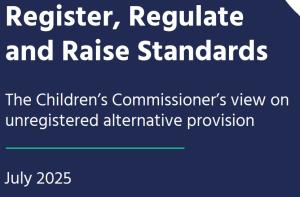This is my fourth annual report on the state of children’s mental health services in England, and my last as Children’s Commissioner. I started this series of briefings because of the torrent of stories I was hearing from children about needing mental health services that weren’t there for them. I wanted to examine the data behind these stories, and hold Government to account on its promises of change.
Six years since I took up the role of Children’s Commissioner, I still hear from children about unacceptable experiences with mental health care. This year I want to take a step back and reflect on two things: progress against plans to improve access to care, and the impact of the pandemic.
Firstly, I want to take stock of what progress had been made over the past five years, a time during which we’ve had an unprecedented number of Government initiatives, a Green Paper, a White Paper and other commitments on children’s mental health. If we look solely at how services have expanded, we can see a significant improvement from a very poor starting position. However, if we look at this in terms of the underlying needs of children, the improvements seem far more modest. The sad truth is that, in spite of progress, services are still nowhere near meeting the level of need and hundreds of thousands of children are being left without help as a result. Some notable exceptions are the local areas which have improved services above and beyond what central Government has expected of them.
Secondly, this briefing looks at the impact of Covid, which has turned the lives of children upside down and placed the NHS under unimaginable strain. Children have had major disruption to two years of education, and have had extremely limited opportunities to see friends and wider families, to play and enjoy activities. More than this, many will have been very worried about the impact of Covid on their families. Taken together, this cocktail of risks and stresses appears to have taken a very heavy toll on some children. A large-scale study, undertaken by the NHS in July 2020, found that clinically significant mental health conditions amongst children had risen by 50% compared to three years earlier. A staggering 1 in 6 children now have a probable mental health condition. We do not know how far this spike will have long term consequences on children’s mental health, nor do we know the impact of further lockdowns, but it is highly likely that the level of underlying mental health problems will remain significantly higher as a result of the pandemic. The data I am publishing today covers the period up to end of March 2020, so largely pre-Covid, but what it shows is a system without the necessary capacity or flexibility to respond to such seismic events in the lives of children.
Once we move past the current crisis, we will need to review the NHS’s funding and capacity. This will provide an opportunity to look again at children’s mental health services and my fervent hope is that Government will significantly upscale its ambition to deliver a wholesale change in the way we provide children’s mental health services. The work that has been undertaken over the past five years paves the way for this. In particular, the creation of Mental Health Support Teams (MHSTs) , which provide a model of integrated mental health care across schools and the NHS, should allow children to access a graduated range of support. A positive development from the Covid-19 crisis is that it has shown that some of this can be provided digitally.
The Government’s current plan – to roll out NHS-led counselling in schools to 20-25% of areas by 2023 – was never ambitious enough. This was my response to the original Green Paper, and a view shared by the joint inquiry of the Education and Health Select Committees. At the time I called for more collaboration with existing voluntary sector provision to help roll this out faster. This would have provided greater capacity and flexibility – something which has been needed more this year than ever. It is vital that these counselling services are available for every school as quickly as possible. When we see what the NHS has achieved within the last year, it shows what can be done with the right level of ambition and determination. It should not have to take another decade to create a decent mental health service for all children.
View local area maps presenting 2019/20 Clinical Commissioning Group (CCG) performance on five key indicators used to assess children’s mental health services (CYPMHS) provision.



